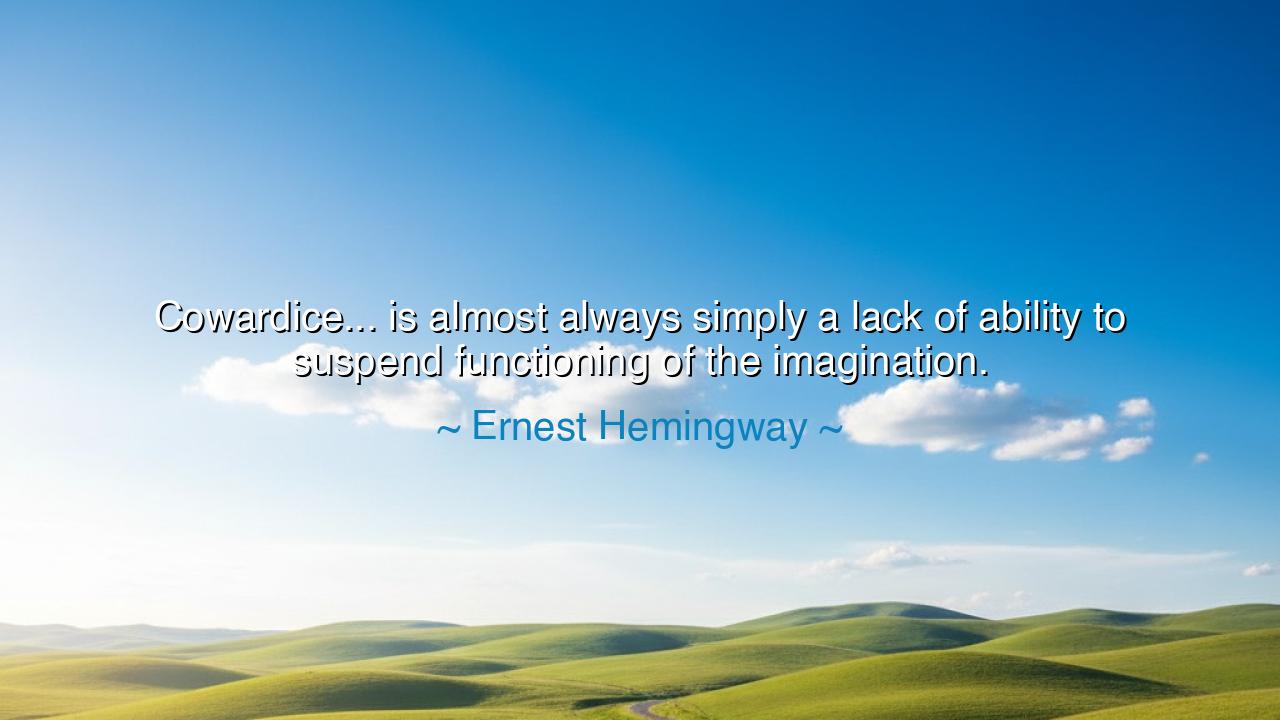
Cowardice... is almost always simply a lack of ability to suspend
Cowardice... is almost always simply a lack of ability to suspend functioning of the imagination.






“Cowardice… is almost always simply a lack of ability to suspend functioning of the imagination.” Thus spoke Ernest Hemingway, the soldier, the adventurer, and the storyteller of courage and despair. In this fierce declaration, Hemingway strikes at the heart of human fear. He teaches that cowardice is not the absence of bravery, but the failure to silence the imagination when it paints before us the horrors that might come. The coward is not destroyed by danger itself, but by the mind’s vivid creation of danger—the visions of pain, shame, and death that freeze the soul before the body has even moved. True courage, then, is the mastery of the mind—the ability to quiet the inner storm of imagination when it turns against us.
The origin of this thought lies deep within Hemingway’s own life and experience. He was a man who lived close to violence and mortality, serving as an ambulance driver in the First World War, reporting from war-torn lands, and hunting beneath the relentless African sun. He saw men die not only from bullets, but from fear—those who, overwhelmed by the pictures their own minds had drawn, could not act. For Hemingway, fear was not a shameful emotion; it was natural, even necessary. But cowardice arose when fear became so powerful that imagination ran wild, conjuring defeat before the battle even began. The brave man, he believed, was the one who could suspend that imagination—who could act in the moment without letting his thoughts destroy him.
To understand Hemingway’s wisdom, one must look to the fields of war. In the trenches of Europe, young soldiers often trembled not at the sound of the guns, but at what their minds foresaw—the agony of a wound, the sight of a friend falling, the long silence of death. Some fled or froze, not because their hearts were weaker, but because their imaginations were too vivid. Yet beside them stood others who, equally afraid, managed to shut those visions away. They felt fear but moved through it. Hemingway saw in this not the absence of imagination, but the mastery of it. To suspend imagination in moments of crisis is not to become dull or unfeeling; it is to command one’s own mind as a warrior commands his sword.
There is a story from Hemingway’s own time in Italy that echoes this truth. Once, while driving an ambulance under fire, he was struck by shrapnel. Wounded and bleeding, he carried another injured man to safety before tending to himself. Later, when asked how he found the courage, Hemingway answered with characteristic simplicity: “You do it because it has to be done.” That was his philosophy—action before terror, focus before imagination. He did not claim to be fearless; he claimed only to act before fear had time to rule him. His words remind us that the difference between courage and cowardice is often no more than the blink of a thought—the moment when imagination is either silenced or allowed to speak too loudly.
In truth, imagination is both a gift and a curse. It allows us to foresee danger, to plan, to dream—but when uncontrolled, it becomes a tormentor, showing us endless shadows of suffering. The wise soul learns not to destroy imagination, but to govern it. The hero does not lack fear; he simply chooses not to indulge it. The mind that can suspend its fearful visions becomes free to act in clarity. The soldier who charges into battle, the surgeon who cuts to save a life, the artist who dares to create—all must, in their moment of trial, quiet the imagination’s doubts and act with pure presence.
O listener, understand this sacred balance: imagination is the mother of both cowardice and courage. The coward sees through it only what might destroy him; the brave sees what must be done despite it. Therefore, courage is not the absence of imagination, but its discipline. One must learn, when fear comes, to look steadily into the heart of the moment, not into the shadows of what may come. For fear grows in the mind’s garden, not in the battlefield itself.
Take this lesson as a guide for your own life: when trials arise, when uncertainty darkens your path, do not let your imagination betray you. Do not let it whisper doom or paralysis into your heart. Instead, suspend it—breathe, focus, act. Replace thought with motion, doubt with decision. For action is the only cure for fear, and the disciplined mind is its own protection. In this way, you will discover what Hemingway knew—that courage is not a gift of the gods, but a skill of the soul. And when you learn to master your imagination, you will find that fear no longer commands you—you command it. Thus shall you live, not as a prisoner of your mind, but as a warrior of your own will.






AAdministratorAdministrator
Welcome, honored guests. Please leave a comment, we will respond soon